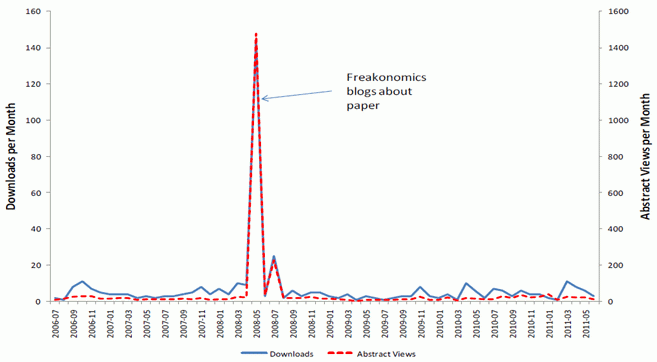Why do many economists, especially in the US, devote a lot of time and effort to manage a blog (notable examples are Steve Levitt, Paul Krugman, Brad De Long, Greg Mankiw, Dani Rodrik, Becker and Posner, Mark Thoma, John Taylor)? Perhaps the professors, at a certain age, are just fed up with the long lags required to publish in scientific journals? Or do they simply wish to gain greater visibility, for themselves and their scientific work? Do they do it for ‘civic duty’, in order to popularise their ideas, to generate a debate and get feedback from readers? Even more puzzling, why in many European countries, namely Italy, does this not happen?
Three effects
A recent CEPR Discussion Paper (McKenzie and Özler 2011) addresses some of these questions. The authors test the following hypotheses:
a) A link from the eight major American blogs to papers enhances significantly their number of downloads and abstract views;
b) That writing a blog significantly improves the author’s reputation above his scientific peers;
c) That blogs affect the opinions of the readers.
The results are quite interesting. The link from a blog increases significantly the paper’s downloads and abstract views in the month of the blog publication and, to a lesser extent, in the following month. Figure 1 shows that some blogs have a very large visibility ‘multiplier’ effect. A quote from Paul Krugman’s blog, or Marginal Revolution, or Freakonomics leads to an increase in the number of abstract views by between 300 and 470 units (compared to a monthly average of 10.3 views for NBER papers). Moreover the number of downloads increases by between 33-100 units (compared to the monthly average of 4.2 for the average NBER paper).
Figure 1. Abstract views and downloads per month for a typical paper
For the second hypothesis, the authors use the results of a survey about the most admired economists in the US, and intersect the results with the rankings (RePEc) of the top 500 economists in the world, based on scientific publications. The authors test if the probability of appearing in the list of the most admired economists, controlling for scientific ranking, is influenced by being a blogger or not. It is. Bloggers are about 40% more likely to appear in the list of most admired economists – an effect equivalent to that of being among the 50 top world economists based on publications records.
Finally, to assess the impact of blogs, the authors conduct a random selection experiment on 619 students of Masters and PhDs in Economic Development, young economists of the World Bank, and young employees at NGOs, some of which were prompted to check out a new blog to follow the World Bank. The results show that those who are exposed to the blogs give a better assessment of the quality of research at the World Bank, and of the desirability to get a job there.
US vs. Italy
Thus in the US the blogs of individual economists, often academics, significantly increase the visibility of scientific papers, the reputation of the authors, and affect the readers’ opinions – three good reasons to ‘waste’ time blogging. But then why do Italian academics, with few exceptions, not have blogs?
If you scroll down the ranking of the most popular 500 Italian blogs in economics you find, almost exclusively, ‘collective’ blogs, such as lavoce.info (the Italian partner of voxeu.org).
Certainly this cannot be due to individual incentives relating to the academic career. If blogging has a high opportunity cost because it subtracts precious time from research, this explanation would imply that academic merit has a larger impact on academic careers in Italy than in the US, which is rather implausible.
The alternative explanation relies on nonacademic incentives. If the individual benefits (personal reputation, dissemination of results, ability to influence the public opinion) are perceived in Italy as a fraction of those accruing in the US, it is rational to share the costs by joining a collective blog. But then this explanation leads to another question. What explains this perception?
I advance here a few hypotheses:
- Italy’s ‘economic literacy’ is far below that of the US, and this implies lower benefits from blogging;
- Italy’s concentration of media ownership is far larger in Italy, which leaves less room for individual initiatives;
- Italian (European) economists share a Catholic/post-Marxist culture which places much less confidence on individual, as opposed to collective, achievement;
- The ‘market size’ is much lower in Italy, also due to language barriers, and this limits the gains from blogging;1
- The benefits of personal (nonmarket) networks in Italy are far larger than the benefits of market-oriented activities such as blogging.
These possible explanations deserve empirical scrutiny. Any PhD student volunteers?
References
Manasse, P and A Turrini (2001), “Trade, Wages and Superstars”, Journal of International Economics.
McKenzie, D and B Özler (2011), “The Impact of Economics Blogs”, CEPR Discussion Paper 8558, September.
1 For a formal discussion of Rosen-type 'superstars' effects in a model of international trade see Manasse and Turrini (2001).



